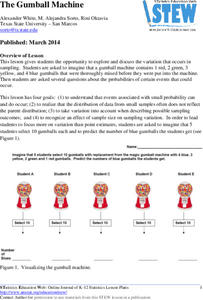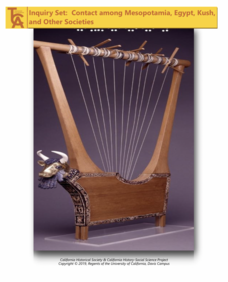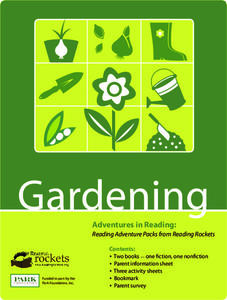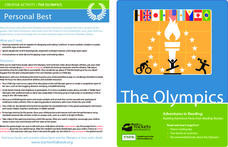American Statistical Association
The Gumball Machine
Chew on an activity for probability. Given information on the number of gumballs in a gumball machine, scholars consider how likely it is to randomly draw a blue gumball and how many of each color they would draw in 10 trials if the...
American Statistical Association
The Mean and Variability from the Mean
Discover the mean from fair share to the balance point. The lesson takes small groups of pupils through two different interpretations of the mean, the fair share understanding of the mean, and the balance point. Scholars use the...
Franklin D. Roosevelt Presidential Library & Museum
The Power of Propaganda in Shaping Civic Actions and Understanding
Propaganda posters are powerful. Using images from The Art of War: American Poster Art 1941-1945 exhibit, young historians analyze the symbols, images, colors, and text used to rally support for World War II. Through seven activities,...
British Council
Forced to Wear a Skirt
What's the dress code? Scholars read brief texts about school uniforms and discuss opinions for and against them. Pupils then work with a partner to role play a conversation about school uniforms.
British Council
Reading House
Scholars work in pairs to describe their homes and draw a picture of their partner's home. Next, individuals discuss their ideal home in small groups and follow up their discussion with a written description.
British Council
Christmas
Pupils learn more vocabulary and English language by taking a close look at the words Happy Christmas and working in groups to see how many words they can make of the letters. Scholars then take a quiz to test their knowledge about...
University of California
Religious Influences
While the Roman empire often conjures up images of soldiers and emperors, its culture was more complex. Using primary sources, including ancient historians and pictures of artifacts, pupils consider the religious influences on Roman...
University of California
Silk Roads
We take for granted globalization today, but its roots run deep within China centuries ago. Using texts from ancient Chinese historians and photographs of items showing growing Eurasian trade, scholars look at the traces of...
University of California
Hellenistic Culture
It doesn't take long to change the world! Alexander the Great's reign may have been short-lived, but his vision for a multi-cultural Hellenistic world shaped Afroeurasia for centuries. Pupils examine documents, such as excerpts from...
University of California
Contact among Mesopotamia, Egypt, Kush, and Other Societies
Trade has always been a global affair. Explore what global trade meant for ancient Mesopotamians, Egyptians, and Kushites using a collection of documents from the historic societies. By examining literary works such as the Epic of...
University of California
Migration of Early Humans: Evidence and Interpretations
While much of prehistory is cloaked in mystery, ancient ancestors left evidence in DNA, languages, and materials from their time. Using photographs of items such as cave paintings and ancient tools, as well as maps of linguistic patterns...
Franklin D. Roosevelt Presidential Library & Museum
Service Learning Projects
Service learning projects provide pupils an opportunity to put the theories they are learning about civics into practice. Scholars investigate the needs of their community and then adopt a project for them to become involved in.
Franklin D. Roosevelt Presidential Library & Museum
The Constitution
Three activities focus on the need to have rules. Young historians are first challenged to suggest rules for their classroom and then to create their own constitution that balances the need for freedoms and protections. The third...
Franklin D. Roosevelt Presidential Library & Museum
Developing Your Voice and Your Right to Free Speech
Three activities focus on the First Amendment, especially the freedom of speech. Scholars craft a letter to the President of the United States and express their views about a topic important to them. Another activity has participants...
Franklin D. Roosevelt Presidential Library & Museum
What Does It Mean to Be an American?
A series of four activities focuses young scholars' attention on what it means to be an American. They identify key qualities, values, and virtues they consider shared by Americans. Participants then pretend they have been selected to...
Franklin D. Roosevelt Presidential Library & Museum
Pearl Harbor Activity #7: Pop Up Video Activity
A pop-up video version of FDR's "Day of Infamy" speech engages scholars in depending their understanding of the attack on Pearl Harbor. After watching the video, class members select five new things that they learned and research how...
Franklin D. Roosevelt Presidential Library & Museum
Pearl Harbor Activity #6: December 7 and September 11 - Infamy Twins?
Why did attackers on December 7, 1941, and on September 11, 2001, choose the targets they did? That is one of several questions young historians try to answer as they compare and contrast the two attacks. They also consider the...
Franklin D. Roosevelt Presidential Library & Museum
Pearl Harbor Activity #5: The Medium Matters
Young journalists learn that how we get our news and information matters in a collaborative social studies activity. The class is divided into three groups with the first analyzing a transcript of FDR's "Day of Infamy" speech, the second...
Franklin D. Roosevelt Presidential Library & Museum
Pearl Harbor Activity #4: Who is the Audience?
Young historians use the prompts on a worksheet to analyze President Roosevelt's "Day of Infamy" speech. They identify the intended audience for the speech, the devices FDR used to persuade his audience, the responses promoted, and the...
Franklin D. Roosevelt Presidential Library & Museum
Pearl Harbor Activity #3: Public Opinion Word Cloud
As part of a study of the December 7, 1941 attack on Pearl Harbor, young historians imagine the feelings of those who lived during the attack by creating a word cloud of 10 words they think express the emotions of people at that time....
Franklin D. Roosevelt Presidential Library & Museum
Pearl Harbor Activity #2: Why Do Words Matter?
Words matter! That's the big idea behind an activity that asks scholars to replace words in FDR's "Day of Infamy" speech with synonyms. They then listen to a recording of President Roosevelt's address and compare his version to their own.
Franklin D. Roosevelt Presidential Library & Museum
Pearl Harbor Activity #1: Newspaper or Radio Account
After listening to President Franklin D. Roosevelt's "Day of Infamy" speech, young historians research information about the Japanese attack on Pearl Harbor, possible motives for the attack, and the consequences of the attack. Scholars...
PBS
Reading Adventure Pack: Gardening
A Reading Adventure Pack invites scholars to start gardening. Following a reading of two books—fiction and nonfiction—young green thumbs repurpose food containers to grow an herb garden in their kitchen, plant seeds in starter pots out...
PBS
Reading Adventure Pack: The Olympics
The mini Reading Adventure Pack takes a close look at the Olympics. After reading a fiction and nonfiction story, scholars research facts about the host country or a country of their choice participating in the games. The research...

























